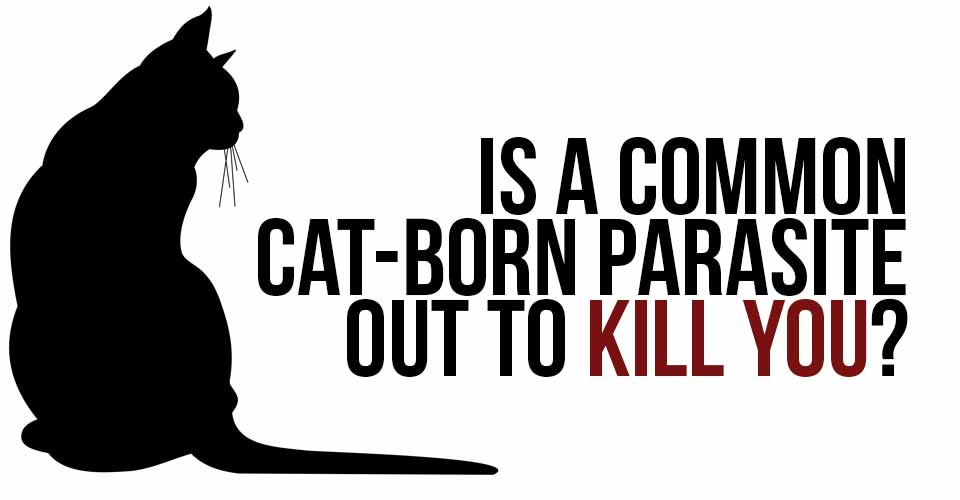
It’s running rampant all over the Interwebs lately: your cat produces a parasite that can take over your brain! Your cat could be making you crazy! And of course the backlash: these studies are all nonsense! Your cat isn’t infecting you with anything! Leave your poor cat alone!
Buy an “Intelligence is sexy” t-shirt!
What you should and shouldn’t do with your cat aside, it can be tough to parse through this information. Which is why I started looking at various sources to make my own determination on toxoplasmosis gondii (Toxo for short) and whether its infection in humans -toxoplasmosis- is really making human beings angrier, more prone to schizophrenia, and possibly even killing us. The results I found are extremely interesting.
Your Cat Is Killing You
On the side of “your cat carries a brain parasite capable of rewiring your brain”, this is actually true. Sort of. Toxo reproduces exclusively in the fecal matter of cats. When another animal comes into contact with the parasite it reworks its brain to make it absolutely love cats. And since this creature is usually a rodent or some small mammal that would make a delicious cat dinner, the parasite drives its host to hunt down a cat…so it can get eaten. Pretty incredible, right? Parasites are amazing.
The Internet has been on fire about this lately because recent studies seem to show a correlation between humans infected with this parasite and a tendency to be angrier, more aggressive, and even exhibit a greater tendency to develop schizophrenia. Kill all the cats!!
Calm Down, People
No, no, no. Don’t kill all the cats. The cats are not the problem. As is often the case when anything goes viral, the problem is the interpretation of the studies, not the studies themselves. One of the most-cited studies on this so-called correlation had only 358 subjects. In a world populated by billions of people, that’s a pretty tiny percentage.
Furthermore, Toxo doesn’t become infectious to humans until it has spent at least one and possibly up to five days in a cat’s feces after excretion. So if you’re a cat owner who is fairly fastidious about cleaning its litter box, use gloves while doing so and wash your hands afterwards, the likelihood that you’ll contract toxoplasmosis from your cat is slim to none.
Researchers Conclude: Cats Are Jerks!!!
Besides, there is a good chance you already have it. Scientists estimate that anywhere from ⅕ to ½ of the human population is infected with toxoplasmosis. We don’t get it exclusively from cats…humans can also get the parasite from undercooked or improperly handled foods such as poultry and lamb, from soil contaminated with cat feces, from fruits and vegetables grown in that soil, etc. It’s a highly effective parasite in terms of transmission.
A Conclusion…of Sorts
So, how does this all work out? Well, like anything worth investigating, the answer is complex and doesn’t lend itself to any kind of simplicity. The results are that we’re still figuring out the results. Some people, including leading research scientists, are absolutely convinced that humans with toxoplasmosis have essentially been taken hostage by a brain parasite, and that evidence increasingly points to that parasite changing out behavior.
Certainly, toxoplasmosis is already dangerous to some humans. Pregnant women, as well as people with compromised immune systems, have long been advised to keep away from cat feces. This is because if Toxo infects a developing brain or an immunologically compromised brain it can cause severe brain damage. It led to the development of severe dementia in many AIDS patients before the causation was understood.
Are The Evil Cucumbers Being Too Cruel To Cats?
Even in healthy humans, toxoplasmosis can cause flu-like symptoms and general malaise, but it usually resolves fairly quickly and the human immune system beats the parasite into dormancy.
The jury is still out, however, on whether or not toxoplasmosis can affect the brain of healthy adult human beings. While some studies seem to show a correlation between Toxo and increased aggression, various other studies and larger bodies of research on the subject discredit those as having sample sizes that are too small or too narrowly-defined. And certainly, while the CDC has published guidelines on prevention and treatment of toxoplasmosis, the infection is not considered a major human health threat.
Perhaps larger studies and future testing will lead to more conclusive results in the future. In the meantime, take care of your cat and clean its litterbox frequently. Your cat will appreciate it and your chances of contracting a brain parasite will be significantly lower.


